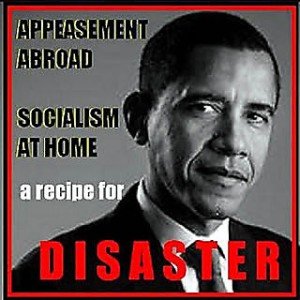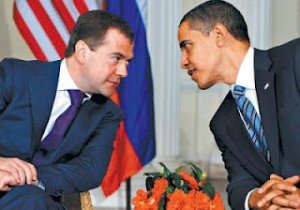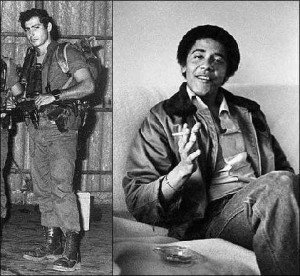Obama Doctrine: talk a lot, do nothing, walk away, declaring victory
Unlike Presidents Monroe, Truman, or Bush, Obama likes to use words dramatically but avoids being pinned down by them, never setting forth a clear national security or foreign policy doctrine other than to enunciate general principles.
By Michael Widlanski
Led by President Barack Obama, the UN and NATO last weekend embraced the three key elements of The Obama Doctrine for international policy and national security: talk a lot, do nothing and then walk away, declaring victory.
- · Meeting in Chicago, NATO announced that it would not intervene in
 Syria even as violence there reached the capital of Damascus and washed over the border into Lebanon, menacing that country with another round of civil war;
Syria even as violence there reached the capital of Damascus and washed over the border into Lebanon, menacing that country with another round of civil war; - · NATO asserted it would pull out of Afghanistan by 2014, even though the Taliban, spurred by Obama’s promises of withdrawal, has been surging and threatens to restore Afghanistan as an Islamic rogue terror state;
- · UN diplomats said they were close to a deal with the ayatollahs of Iran under which Iran keeps most of its illegally-produced weapons grade uranium—for making atomic bombs—but “agrees” to “real” UN inspections of Iranian facilities.
These milestones are all part of the framework of beliefs at the core of “The Obama Doctrine,” which history will judge alongside the Monroe Doctrine, the Truman Doctrine and even the Bush Doctrine.
Unlike Presidents Monroe, Truman, or Bush, Obama likes to use words dramatically but avoids being pinned down by them, never setting forth a clear national security or foreign policy doctrine other than to enunciate general principles:
- · America should not lead by itself, but work always with others, and if necessary, it can “lead from behind;”
- · America should try never to use force or even talk about force, since “military measures” usually means “discussing military options” while carrying out military withdrawals;
- · Actual use of force should be confined to operations by drones and rare use of special operations against isolated terror leaders, such as Osama Bin-Laden. This might be called the Cowardly Chicagoan Concept: When you see a person or a country being mugged, call 911, don’t remember 9-11. When you see terror, call the ACLU. When you see an international bloodbath, call Brussels or call the UN.
The Obama Doctrine is often eerily similar to Ron Paul’s view of the world: America only gets itself into trouble by getting involved. It is much safer to stay on the sidelines and preach. Stick your chin up and sound high and mighty.
President Obama was not shy about invoking his family’s Islamic heritage—Barack HUSSEIN Obama, he said proudly and loudly—as he spoke to crowds in Egypt and harangued Islamist leaders in Turkey and Iran. He hoped to “engage” them with his charm and his message of hope and change.
President Obama engaged the ayatollahs of Iran, and they slaughtered their own people after an incredibly rigged election in 2009. Strike one for hope and change.
President Obama again engaged Iran, hoping to stop or slow down Iran’s intensive efforts to produce atomic weapons and missiles that can reach Europe and America. Iran sped up bomb making and missile production: Strike two for hope and change.
 He made a dramatic trip to Egypt, sermonizing Hosni Mubarak about democracy, not mentioning Islamic terror, and inviting the Muslim Brotherhood for dinner. But he who invites extremists to dinner should not be surprised if they to stay for desert. The next few days may show how much “hope and change” Obama has brought Egypt.
He made a dramatic trip to Egypt, sermonizing Hosni Mubarak about democracy, not mentioning Islamic terror, and inviting the Muslim Brotherhood for dinner. But he who invites extremists to dinner should not be surprised if they to stay for desert. The next few days may show how much “hope and change” Obama has brought Egypt.
Obama preached to Israel to stop all “settlements,” as he and Joe Biden

Netanyahu and Obama
lectured Israel about 20-year-old housing projects in Jerusalem. This policy led to a total breakdown of Israeli-Palestinian talks. Another home run for hope and change.
Obama made his first major foreign trip to Turkey, whose leader, Recep Erdogan, is seen as a real friend by Obama. That same Erdogan denied NATO fly-over rights, and Turkey has aided quasi-terror operations against Israel such as the Gaza flotilla.
Whether Obama is re-elected or not, his policies may have long-lasting impact, and the question is, how will the Obama Doctrine rate among presidential doctrines? President James Monroe asserted that the U.S. would jealously guard what took place in America’s backyard, while Harry Truman launched the containment policy to confront Communism, and George W. Bush set forth a robust policy against terror.
What will be Obama’s legacy? Will it include an isolated Israel and a nuclear Iran, a bloody Syria and an aggressive Islamist Turkey, renewed terror in Afghanistan and a prostrate Egypt? Are these messages of hope and change? It is time for President Obama to start supplying some answers instead of vague high-tone phrases.
Dr. Michael Widlanski, an expert on Arab politics and communications, is the author of Battle for Our Minds: Western Elites and the Terror Threat just published by Threshold/Simon and Schuster. He is a former reporter, correspondent and editor respectively at The New York Times, Cox Newspapers, and The Jerusalem Post, and he served Strategic Affairs Advisor in Israel’s Ministry of Public Security and as an advisor to Israeli negotiating teams in 1991-92 at the Madrid Summit and thereafter.
Help Make A Difference By Sharing These Articles On Facebook, Twitter And Elsewhere:
